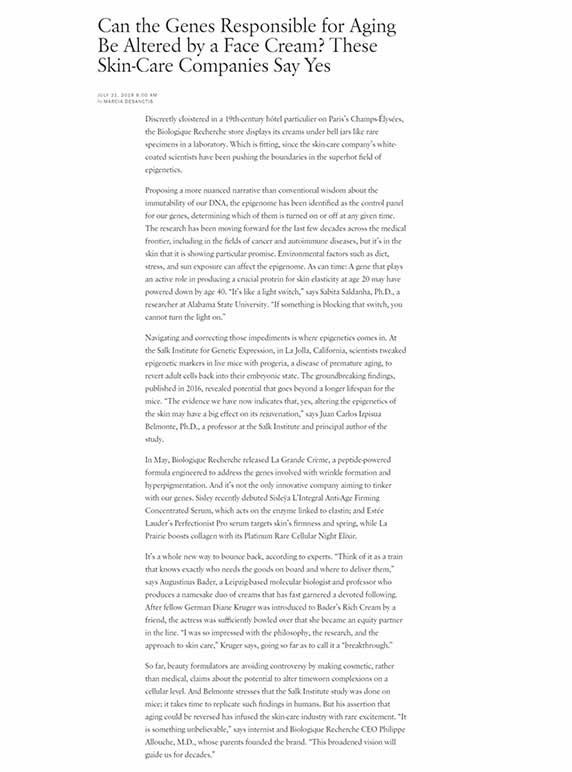"I was so impressed with the philosophy, the research, and the approach to skin care,"
Discreetly cloistered in a 19th-century hotel particulier on Paris's Champs-Elysees, the Biologique Recherche store displays its creams under bell jars like rare specimens in a laboratory. Which is fitting, since the skin-care company's white-coated scientists have been pushing the boundaries in the superhot field of epigenetics.
Proposing a more nuanced narrative than conventional wisdom about the immutability of our DNA, the epigenome has been identified as the control panel for our genes, determining which of them is turned on or off at any given time. The research has been moving forward for the last few decades across the medical frontier, including in the fields of cancer and autoimmune diseases, but it's in the skin that it is showing particular promise. Environmental factors such as diet, stress, and sun exposure can affect the epigenome. As can time: A gene that plays an active role in producing a crucial protein for skin elasticity at age 20 may have powered down by age 40. "It's like a light switch," says Sabita Saldanha, Ph.D., a researcher at Alabama State University. "If something is blocking that switch, you cannot turn the light on.”
Navigating and correcting those impediments is where epigenetics comes in. At the Salk Institute for Genetic Expression, in La Jolla, California, scientists tweaked epigenetic markers in live mice with progeria, a disease of premature aging, to revert adult cells back into their embryonic state. The groundbreaking findings, published in 2016, revealed potential that goes beyond a longer lifespan for the mice. "The evidence we have now indicates that, yes, altering the epigenetics of the skin may have a big effect on its rejuvenation," says Juan Carlos lzpisua Belmonte, Ph.D., a professor at the Salk Institute and principal author of the study.
In May, Biologique Recherche released La Grande Creme, a peptide-powered formula engineered to address the genes involved with wrinkle formation and hyperpigmentation. And it's not the only innovative company aiming to tinker with our genes. Sisley recently debuted Sisleya L'Integral Anti-Age Firming Concentrated Serum, which acts on the enzyme linked to elastin; and Estee Lauder's Perfectionist Pro serum targets skin's firmness and spring, while La Prairie boosts collagen with its Platinum Rare Cellular Night Elixir.
It's a whole new way to bounce back, according to experts. "Think of it as a train that knows exactly who needs the goods on board and where to deliver them," says Augustinus Bader, a Leipzig-based molecular biologist and professor who produces a namesake duo of creams that has fast garnered a devoted following. After fellow German Diane Kruger was introduced to Bader's Rich Cream by a friend, the actress was sufficiently bowled over that she became an equity partner in the line. "I was so impressed with the philosophy, the research, and the approach to skin care," Kruger says, going so far as to call it a "breakthrough.”
So far, beauty formulators are avoiding controversy by making cosmetic, rather than medical, claims about the potential to alter timeworn complexions on a cellular level. And Belmonte stresses that the Salk Institute study was done on mice; it takes time to replicate such findings in humans. But his assertion that aging could be reversed has infused the skin-care industry with rare excitement. "It is something unbelievable," says internist and Biologique Recherche CEO Philippe Allouche, M.D., whose parents founded the brand. "This broadened vision will guide us for decades."



